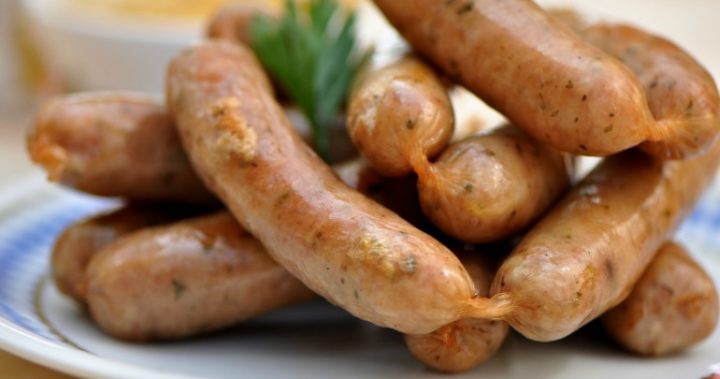
Chowing down at a sausage sizzle is an Aussie custom, along with eating lamingtons and pouring golden syrup on a piece of damper. While we know that these foods are not the healthiest of options, they are traditions Aussies aren’t likely to be keen to give up. But now sausages are under fire – and not in a tasty, barbecued way – for being far too salty.
A new study analysed the salt content in some of Australia’s leading sausage brands and the results were not good. Australians wolf down around 1.1 billion snags every year, all containing 1500 tonnes of salt.
Research from The George Institute for Global Health, VicHealth and the Heart Foundation has revealed that the average sausage in white bread with tomato sauce contains a whopping 2.35 grams of salt, which is nearly half of the recommended daily salt intake.
The study, that was released coincide with World Salt Awareness Week, analysed the salt content of more than 1000 of Australia’s favourite processed meats finding that sausages were repeat-offenders when it came to salt content.
According to the study, the average sausage contains 28 per cent of the maximum recommended salt intake – some very bad news for those who like eating more than two in one sitting.
Sian Armstrong, a dietician from Heart Foundation in Victoria, said that while the salt levels in sausages have remained the same over a number of years, there has been a drop-in salt content in bacon and sliced meat. Armstrong said that this proves the sausage industry can make a change too.
“It’s a massive concern that in almost a decade there’s been no change to the salt levels in sausages. The average Aussie eats 44 sausages a year totalling 16 teaspoons of salt,” Armstrong said. “And some sausages are three times saltier than others.”
“We need targets to drive manufacturers to make their sausages less salty and improve the health of the population.”
After analysing the salt content in prominent sausage brands, the top five saltiest sausages were named and shamed on The George Institute for Global Health website. The top five sausages to avoid included Coles Thin Pork BBQ Sausages, Coles Australian Beef Thin BBQ Sausages Coles, Brannan’s Butchery Classic Aussie Beef Sausages from Aldi, Coles Sow Stall Free Australian Pork Chipolatas and Coles Australian Beef Thick BBQ Sausages.
As if having four of the five saltiest sausages wasn’t enough, Coles’ Thin Pork BBQ Sausages had the highest salt content, containing 80 per cent of the recommended daily salt intake.
In the past, excess salt has been linked to high blood pressure, kidney disease and the probability of having a stroke or heart attack. Armstrong had some handy tips for those wanting to reduce their salt intake.
Some of these included swapping out snags for lean meats such as chicken breast and trying out chicken, beef or lamb skewers when putting on a barbeque. Armstrong also recommended people incorporate more fresh food into their diet rather than relying on processed and packaged foods.
For the sausage lovers, the study also discovered the five sausage brands with the lowest sodium content. If you don’t want to go without, think about trying out Cleaver’s Organic Beef Sausages, Beak & Sons Classics Tuscan Pork Gourmet, K-roo Kanga Bangas, Woolworths Lamb Sausages Mint & Rosemary or Woolworths Chicken Sausages Chives, Thyme & Rosemary.